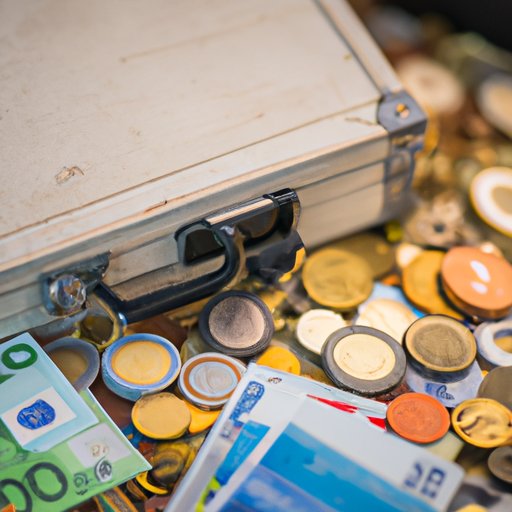
I. Introduction
Not being able to store money in a bank can be a daunting situation for many reasons. It could be due to privacy concerns, non-existent or poor banking services, or simply being unable to access banking facilities. Whatever the reason, the good news is that there are alternative storage options that don’t involve a bank. This article explores creative and safe alternatives for storing money without a bank.
II. Hiding Money at Home
One way to store money without involving a bank is by simply hiding it at home. This can be a good option for those who only have small amounts of money to store and want quick and easy access to it.
A few creative hiding spots for cash and important documents include:
- In an empty tampon or sanitary pad wrapper in your bathroom cupboard
- Inside a tennis ball or a hollow book
- In a locked safe or lockbox secured somewhere in your house
- Inside a false bottom of a drawer or beneath a sink
It’s important to remember to keep your hiding spot safe from theft. To do this, consider the following tips:
- Don’t tell anyone about your hiding spot
- Keep it in a location that’s not easily accessible or visible
- Change your hiding spot regularly and keep multiple ones
III. Alternative Storage Options
If you don’t want to keep large amounts of cash at home, there are other storage options you can consider. Some of these include:
Prepaid Debit Cards
Prepaid debit cards work like regular debit cards but without a bank account tied to them. They are reloadable and can be used to withdraw cash and make purchases online or in-store. A good example of this is the American Express Serve card.
The pros of using prepaid debit cards are:
- No credit check required
- No minimum balance required
- Easy to obtain
The cons of using prepaid debit cards are:
- High fees associated with usage
- No rewards or interest on the balance
Money Orders
Money orders are a way of sending or receiving money in the mail. They can be purchased with cash or a debit card and are paid to the person or organization you’re sending money to.
The pros of using money orders are:
- Accepted by most sellers
- Low fees associated with usage
- No bank account required to obtain
The cons of using money orders are:
- Can’t be used for online purchases
- Limited to a maximum value of $1,000
Digital Wallets
Digital wallets, such as PayPal, are a way of storing money online. They can be used to send money to friends and family, pay bills, and make online purchases.
The pros of using digital wallets are:
- Easy to use
- Fast and secure transactions
The cons of using digital wallets are:
- High fees for some transactions
- Not accepted by all online retailers
- Difficult to use for in-person purchases
IV. Investing in Precious Metals
Investing in precious metals, such as gold and silver, can be a long-term storage solution for your money. These metals are valuable, easy to sell, and can serve as a hedge against inflation.
The pros of investing in precious metals are:
- Relatively stable value over time
- Easy to sell when needed
- Opportunity for long-term growth
The cons of investing in precious metals are:
- High fees associated with purchasing and selling
- Requires physical storage which can be expensive or risky
If you’re thinking of investing in precious metals, it’s essential to research and understand the different types of metals available and the best ways to invest in them. Some options include buying physical bullion, investing in exchange-traded funds (ETFs), or purchasing shares in mining companies.
V. Cryptocurrencies
Cryptocurrencies are digital currencies that use cryptography to secure transactions and control the creation of new units. They provide a way of storing money in a decentralized way that doesn’t require a bank.
The pros of using cryptocurrencies to store money are:
- Decentralized and secure
- Fast and efficient transactions
- Global accessibility
The cons of using cryptocurrencies to store money are:
- Highly volatile value
- Not widely accepted by merchants
- Potentially vulnerable to hacking or theft
If you’re thinking of using cryptocurrencies to store money, it’s important to research and understand the risks and benefits. You’ll also need to choose a secure wallet for storing your digital coins.
VI. DIY “Credit Unions”
If you don’t want to involve a bank but still want to access some of the benefits of a savings account, you can consider setting up a shared fund with friends or family members.
Some tips for setting up a safe and responsible shared fund include:
- Choose trustworthy members for the group
- Set specific goals and rules for the fund
- Agree on a method for distributing funds fairly
- Keep accurate records of all transactions
- Consider seeking legal advice on setting up the fund
VII. Conclusion
Storing money without involving a bank doesn’t have to be difficult or risky. There are plenty of safe and creative alternatives available, depending on your needs and preferences. Whether you choose to hide cash at home, invest in precious metals, use cryptocurrencies, or set up a fund with family and friends, remember to always do your research, consider the risks and benefits, and take steps to keep your money safe.
By considering all options, you can make an informed decision on what works best for you and what options combine might provide the best storage solution without the need for a traditional bank.




